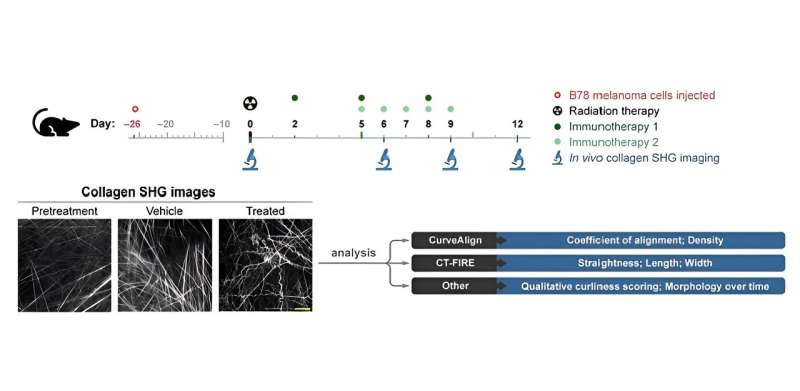This article has been reviewed according to Science X's editorial process and policies. Editors have highlighted the following attributes while ensuring the content's credibility:
fact-checked
trusted source
proofread
Quantitative imaging reveals collagen changes in melanoma tumors during immunotherapy

Collagen, a major component of the extracellular matrix, plays a crucial role in tumor development. During the development of tumors ("tumorigenesis"), collagen fibers become linearized and densely deposited, hindering immune cell infiltration and promoting tumor metastasis. However, quantifying these collagen changes during melanoma progression has been challenging.
As reported in Biophotonics Discovery, researchers from the Morgridge Institute for Research and University of Wisconsin—Madison recently addressed this challenge by using quantitative imaging to visualize collagen in preclinical mouse melanoma models during immunotherapy. In their study, animals received a combination of curative radiation and immunotherapy; quantifying collagen morphology at both the image and single-fiber levels obtained insights into collagen remodeling over time.
In immunotherapy-treated mice, collagen fibers exhibited a healthier phenotype. These fibers were shorter, wider, and curlier, with modestly higher density.
The study found that single-fiber collagen features, calculated using CT-FIRE software, were more sensitive to treatment-induced changes than bulk collagen features. These single-fiber characteristics could serve as valuable biomarkers for assessing immunotherapy response.
Implications for cancer treatment
Understanding collagen dynamics during immunotherapy is crucial for improving treatment outcomes. The study's findings highlight the potential of quantitative imaging to enhance immunotherapy response in melanoma and other cancers. By identifying new biomarkers associated with collagen changes, researchers aim to optimize therapeutic strategies and personalize cancer treatments.
This research opens doors to novel approaches in cancer therapy, emphasizing the importance of collagen as a dynamic player in the tumor microenvironment. As scientists continue to unravel the complexities of collagen's role, patients may benefit from more effective and tailored treatments.
More information: Alexa R. Heaton et al, Quantifying in vivo collagen reorganization during immunotherapy in murine melanoma with second harmonic generation imaging, Biophotonics Discovery (2024). DOI: 10.1117/1.BIOS.1.1.015004




















